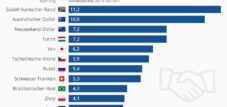Mega deal nearing completion: World's largest free trade zone – The EU-Mercosur agreement
Xpert pre-release
Language selection 📢
Published on: September 4, 2025 / Updated on: September 4, 2025 – Author: Konrad Wolfenstein

Mega deal about to be concluded: World's largest free trade zone – The EU-Mercosur agreement – Image: Xpert.Digital
Europe's response to Trump's tariffs: How this pact is shifting the global balance of power
### 4 billion euros per year: Why German car companies are now pinning their hopes on the Mercosur deal ### Cheaper meat versus more expensive cars? How the Mercosur trade pact directly affects you ### Climate killer or Green Deal for two continents? The truth about the controversial EU agreement ###
Huge opportunity or sell-out? The bitter dispute over the Mercosur agreement
After more than 25 years of tough negotiations, the global economy is facing a historic turning point: the EU-Mercosur agreement, which would create a free trade area involving over 715 million people, is about to be ratified. But this agreement is far more than just a trade agreement. It is a geopolitical statement, a gigantic economic opportunity, and at the same time the subject of fierce controversies that are dividing Europe.
On the one hand, the pact promises enormous benefits: By eliminating tariffs, European exporters could save around €4 billion annually, and key industries such as the automotive, mechanical engineering, and chemical sectors in Germany would benefit massively. Strategically, the EU is thus positioning itself as an advocate of free trade and creating a counterweight to US protectionism and growing dependence on China.
On the other hand, there is fierce resistance from farmers and environmentalists. They warn of unfair competition from cheaper agricultural imports from South America and fear accelerated deforestation of the Amazon rainforest for cattle pastures and soybean fields. While the agreement does contain sustainability chapters, critics doubt their effectiveness. This text sheds light on the far-reaching opportunities, the deep divides, and the crucial questions that now lie ahead: Will Europe succeed in balancing economic growth, strategic independence, and sustainable responsibility?
Suitable for:
- Strategic realignment of the supply chains and logistics: A requirement of the hour - at short notice, in the medium term and long -term
What does the EU-Mercosur agreement mean for the global economy?
With the European Commission's approval of the EU-Mercosur agreement, the world is on the verge of the creation of one of the largest free trade areas in history. What exactly lies behind this historic trade deal, and what impact will it have on the global economic order?
The agreement between the European Union and the South American Mercosur states of Brazil, Argentina, Uruguay, and Paraguay would create a free trade zone with more than 715 million inhabitants. According to the EU Commission, this would be the largest of its kind in the world and thus represent a significant alternative to the protectionist trade policy of the United States under President Donald Trump.
Negotiations on this agreement lasted over 25 years. The EU began initial talks with the Mercosur states in 1999, with negotiations on the trade-related parts initially concluded in June 2019. The final political and cooperation parts were then negotiated in June 2020, before the Commission adopted the proposals for Council decisions on the signature and conclusion of the agreement on September 3, 2025.
How is Mercosur organized and what is its economic significance?
Mercosur, whose full name is "Mercado Común del Sur" or "Common Market of the South," is an international economic organization in Latin America established in 1991 by the Treaty of Asunción. The organization currently comprises four full members: Argentina, Brazil, Paraguay, and Uruguay, with Venezuela permanently suspended since 2016. Bolivia joined as its newest full member in 2023.
With a gross domestic product of approximately USD 2.4 trillion and a foreign trade volume of approximately USD 400 billion in exports and USD 330 billion in imports, Mercosur is the third largest market in the world after the EU and NAFTA. Mercosur's total trade volume in goods was approximately USD 668.7 billion in 2023, with exports amounting to approximately USD 378.8 billion and imports to approximately USD 290 billion.
The region boasts significant raw material reserves that are important for Europe's climate transition, including lithium, nickel, and rare earths. Europe, in turn, is a key supplier of automobiles, machinery, and chemicals to the Mercosur countries.
What specific trade facilitation measures does the agreement bring?
The core of the EU-Mercosur agreement is the extensive reduction of tariffs and trade barriers. Tariffs are to be eliminated for 91 percent of all goods traded between the EU and Mercosur. According to calculations by the European Commission, the tariff reduction will result in annual savings of €4 billion for European exporters.
The current tariff rates that would be eliminated are particularly drastic: Mercosur currently imposes some of the highest external tariffs in the world, for example, 35 percent on cars, 14 to 20 percent on machinery, and up to 18 percent on chemicals. These high tariffs represent significant trade barriers that hinder European companies from exporting to the region.
The agreement would not only reduce tariffs but also protect geographical indications of origin for 350 European food products in Mercosur, including traditional products such as Munich beer and Tyrolean bacon. This is the largest number of geographical indications ever protected under an EU agreement.
What economic impact is expected for the EU?
The EU Commission predicts significant positive economic effects from the agreement. Annual EU exports to South America could increase by up to 39 percent, or €49 billion, supporting more than 440,000 jobs across Europe. In 2024, the trade volume between the EU and the Mercosur countries already reached €112.3 billion.
Several key EU industries would particularly benefit: The automotive industry could significantly benefit from the abolition of the 35 percent tariffs on vehicle imports. Mechanical engineering, which currently faces tariffs of between 14 and 20 percent, would also benefit significantly. The pharmaceutical industry, which is currently burdened with tariffs of up to 14 percent, would have improved export opportunities.
Around 70 percent of the 12,500 German companies exporting to Mercosur are small and medium-sized enterprises. These would be addressed through a separate chapter in the agreement, for example through funding programs and support for market development.
How is the EU reacting to the protectionist US trade policy?
The EU-Mercosur agreement is also seen as a strategic response to the protectionist tariff policy of US President Donald Trump. Since taking office, Trump has introduced a series of additional tariffs that burden international trade. These include a universal tariff of 10 percent on imports over $800, increased tariffs on steel and aluminum of up to 50 percent, and country-specific additional tariffs.
The EU is consciously positioning itself as a reliable, rules-based, and predictable trading partner as a counter-model to protectionist reflexes. Amid global uncertainty, the EU can become an anchor for reliable trade policy, thus not only preventing escalation but also actively contributing to stabilizing the global economy.
The Mercosur agreement is part of a broader EU strategy to diversify trade relations and reduce critical dependencies, particularly on China. Countries such as Germany and Spain explicitly support the agreement, as they consider it important for reducing dependence on China.
Suitable for:
Which sectors would particularly benefit from the agreement?
The EU-Mercosur agreement would impact different economic sectors to varying degrees. On the European side, the focus is on several industries that are particularly affected by the current high tariffs.
The chemical industry, which accounts for 14.1 percent of EU exports to the Mercosur countries, would benefit from the abolition of tariffs of up to 18 percent. The Mercosur countries are important buyers of agricultural and industrial chemicals, which would significantly reduce the burden on European manufacturers.
The mechanical engineering sector, which accounts for 21.5 percent of EU exports, currently suffers from tariffs of between 14 and 20 percent, which are among the highest in the world. The German Mechanical and Plant Engineering Association (VDMA) sees the agreement as an important opportunity to better tap into the large Brazilian market.
The automotive industry would benefit from the gradual elimination of the 35 percent tariffs on vehicles and the 14 to 18 percent tariffs on auto parts. This is particularly important as competitive pressure in South America is increasing dramatically due to the market entry of Chinese automakers.
For the pharmaceutical industry, which accounts for 12.4 percent of EU exports, the current tariffs would be eliminated by up to 14 percent. However, European manufacturers would not have free access to public health contracts.
What are the benefits for European agriculture?
The EU-Mercosur agreement also opens up new export opportunities for European agriculture. The EU exported agri-food products worth €3.3 billion to Mercosur in 2024, and these exports are expected to increase as a result of the agreement.
Exporters of olive oil, currently subject to a 10 percent tariff, wine, with tariffs of up to 35 percent, beverages other than wine, with tariffs of up to 35 percent, and chocolate, with a 20 percent tariff, would particularly benefit. For some dairy products, tariffs would be gradually eliminated entirely for certain quotas, including 30,000 tons of cheese, 10,000 tons of powdered milk, and 5,000 tons of infant formula, which are currently subject to tariffs of 28 percent and 18 percent, respectively.
The agreement also protects around 344 EU food and beverage products from imitation in Mercosur countries through the protection of geographical indications. This allows these products to be more easily differentiated from others, allowing producers to strengthen their market position in Mercosur countries and sell at higher prices.
How are the interests of EU agriculture protected?
Despite the opening to South American agricultural products, the agreement provides comprehensive protective measures for European agriculture. The EU will grant only very limited market access for imports of agricultural foodstuffs.
For sensitive goods such as beef, poultry, or sugar, access to the EU market will remain permanently restricted through quotas that will be gradually introduced. In addition, a bilateral safeguard clause can be applied if increasing imports from Mercosur seriously damage, or even threaten to damage, the relevant EU sectors.
No duty-free access is granted for beef from Mercosur. Only 99,000 tons can enter the EU market with a reduced tariff of 7.5 percent, which represents only 1.5 percent of total European beef production and less than half of current imports from Mercosur.
The EU Commission has also promised robust protective measures for sensitive agricultural products and announced an additional legal act that will clarify in detail the activation and control of the protective measures.
What political resistance is there to the agreement?
Despite its economic benefits, the EU-Mercosur agreement is facing considerable political resistance in several EU member states. France has long been considered the agreement's biggest critic and, along with Poland and other countries, has threatened to block ratification.
President Emmanuel Macron justified the French opposition by arguing that it was necessary to protect its own farmers, particularly from cheaper poultry and beef from South America. Poland and Italy also called for compensation for agriculture. Austria's National Council has spoken out against the agreement, although a change of position is theoretically still possible.
However, positive signals are now emerging from some previously critical countries. Polish Prime Minister Donald Tusk has indicated a willingness to compromise, offering assurances that the EU could take defensive measures in the event of market distortions. It is likely that the EU Commission will offer precisely this assurance.
However, the agricultural lobby remains skeptical about the agreement, fearing negative effects on domestic producers.
Our recommendation: 🌍 Limitless reach 🔗 Networked 🌐 Multilingual 💪 Strong sales: 💡 Authentic with strategy 🚀 Innovation meets 🧠 Intuition
At a time when a company's digital presence determines its success, the challenge is how to make this presence authentic, individual and far-reaching. Xpert.Digital offers an innovative solution that positions itself as an intersection between an industry hub, a blog and a brand ambassador. It combines the advantages of communication and sales channels in a single platform and enables publication in 18 different languages. The cooperation with partner portals and the possibility of publishing articles on Google News and a press distribution list with around 8,000 journalists and readers maximize the reach and visibility of the content. This represents an essential factor in external sales & marketing (SMarketing).
More about it here:
Geopolitical signal: How the agreement strengthens Europe's trading power
How does the ratification process work?
The EU-Mercosur Agreement consists of two separate parts, each requiring separate ratification procedures. For the trade-only part to enter into force, approval by the EU Council and the European Parliament would be sufficient, since trade competence lies with the EU and not with the member states.
This applies to the largest part of the agreement and allows for faster implementation of trade-related provisions. General policy issues will then also require approval from national parliaments.
On September 3, 2025, the European Commission adopted proposals for Council decisions on the signing and conclusion of two parallel legal instruments: the EU-Mercosur Partnership Agreement and the Interim Trade Agreement. The Interim Trade Agreement will be repealed and replaced by the Partnership Agreement once the latter has been fully ratified and entered into force.
The Brussels authority hopes that the EU Council and European Parliament will agree by the end of the year at the latest, thus enabling the final conclusion of the agreement.
Suitable for:
- Resilience through diversification: Strategic realignment of global supply chains in the geopolitical area of tension
What environmental and climate protection concerns are there?
The EU-Mercosur agreement is at the center of an intense debate about its environmental impact. Environmental organizations like Greenpeace describe the agreement as climate-damaging and fear that it would lead to increased deforestation in South America.
The agreement would allow Mercosur countries to sell more agricultural products and raw materials, which often come from forested areas like the Amazon. Approximately 21 to 37 percent of global deforestation is already attributable to global trade. Critics fear that increasing imports of agricultural products such as beef, soy for animal feed, and bioethanol from sugar cane could accelerate deforestation.
A study by Greenpeace and Misereor shows that the agreement would increase import quotas for beef and chicken by half, while bioethanol imports are expected to increase sixfold compared to current levels. The Amazon rainforest, as well as other important ecosystems such as the dry forests of Argentina's Gran Chaco and the savannah forests of the Brazilian Cerrado, would increasingly be sacrificed for more cattle pastures and soybean fields.
What environmental protection provisions does the agreement contain?
The EU-Mercosur agreement does contain provisions on environmental protection, but non-governmental organizations believe these are not sufficiently binding. The ambitious chapter on sustainable development contains binding regulations on labor, the environment, and climate.
The parties commit to ratifying the fundamental and other relevant conventions of the International Labour Organization and effectively implementing multilateral environmental agreements, including the Paris Climate Agreement. Specific anti-deforestation provisions also apply to the Mercosur states.
The Paris Climate Agreement is now an integral part of the agreement, allowing for the suspension of the agreement if commitments are not met. Brazil, for example, has committed to reducing net greenhouse gas emissions by 37 percent by 2025 compared to 2005 levels and taking measures to end illegal deforestation.
In addition, the EU Deforestation Regulation will enter into force at the end of 2025. It is intended to ensure that only deforestation-free products enter the EU market. This applies to soybeans, beef, palm oil, timber, cocoa, coffee, and rubber, and also to imports based on the EU-Mercosur Partnership Agreement.
Are there concerns about the effectiveness of environmental protection measures?
Critics doubt the effectiveness of the environmental protection provisions contained in the agreement. A recent study by Bread for the World, Misereor, and Powershift warns that the current version grants the Mercosur states the right to sue against Europe's sustainability laws, which are part of the Green Deal.
The newly created compensation mechanism is anchored in the central arbitration process and grants states the right to compensation if EU laws such as the Deforestation Regulation restrict their trade advantages. Critics fear that the EU would permanently shackle itself when it comes to climate protection.
Furthermore, the EU Forest Protection Regulation only protects forests and excludes other ecosystems such as savannas and peatlands, which are also being destroyed for agricultural land. The EU-Mercosur agreement also promotes products not covered by the EU Forest Protection Regulation, such as chicken and sugar cane.
Experience with other trade agreements already shows negative environmental impacts. In the EU-Andean Agreement, increased demand for agricultural products led to an expansion of cultivated areas, and more than a third of the land was cleared in the first four years.
How does the agreement position itself compared to other global trading blocs?
The EU-Mercosur agreement is not just a bilateral trade deal, but also a strategic signal to other major economic powers. By creating a free trade area encompassing over 715 million people, Europe would cement its position as the world's largest trading bloc.
The agreement is explicitly seen as a response to the protectionist tariff policy of US President Donald Trump. While the US has significantly increased its tariffs under Trump—for example, universal 10 percent additional tariffs and up to 50 percent on steel and aluminum—the EU is focusing on trade liberalization and market opening.
At the same time, the agreement serves as an instrument for diversifying trade relations and reducing dependence on China. Diversifying trade relations is essential for reducing critical dependencies and creating resilient supply chains.
The EU is thus seeking to strengthen its role as a reliable, rules-based trading partner and position itself as an alternative to protectionist approaches. This is particularly important as the WTO-centered multilateral trading order is eroding and protectionism is increasing worldwide.
What impact does the agreement have on small and medium-sized enterprises?
The impact of the EU-Mercosur agreement on small and medium-sized enterprises, which account for a significant share of exporters, deserves special attention. Approximately 70 percent of the 12,500 German companies exporting to Mercosur are small and medium-sized enterprises.
These companies are addressed in a separate chapter of the agreement, which provides support programs and assistance in market development. The elimination of high tariffs and the simplification of trade procedures can significantly ease the burden on smaller companies, as they often have fewer resources to overcome complex trade barriers.
The agreement also provides for improved access to public procurement, which will benefit European companies. EU service providers will gain better market access in the information technology, telecommunications, and transport sectors.
However, cultural and language barriers, as well as the time difference, make market access difficult for German companies. Currently, Germany tends to focus its business on Asia, Europe, or the USA, while Latin America is often considered too far away.
How does the agreement affect the global supply chain structure?
The EU-Mercosur agreement will have a significant impact on global supply chains. The reduction of tariffs and trade barriers will create new trade flows and strengthen existing ones. This is particularly relevant given the current geopolitical tensions and the need to diversify supply chains.
The agreement contributes to securing the sustainable supply of critical raw materials for the EU's green and digital transformation and ensures greater security and predictability in the supply chain. The Mercosur region has important raw material deposits such as lithium, nickel, and rare earth elements, which are essential for the European energy transition.
The trade agreement also reduces tariffs on key raw materials and derived products. This reduces Europe's dependence on other suppliers, especially China, and creates alternative sources of supply.
At the same time, rules of origin are becoming increasingly important for determining the origin of goods. These rules are particularly important in the era of global value chains, where a significant portion of the value of European products is derived from foreign components or services.
What are the long-term strategic implications?
The EU-Mercosur agreement has far-reaching strategic implications that go beyond its immediate trade effects. It signals Europe's commitment to a rules-based, multilateral world trading order at a time of increasing trade tensions.
By creating the world's largest free trade area, the EU would strengthen its position as a leading trading power while counteracting protectionist tendencies. This is particularly important as the World Trade Organization is under pressure and bilateral and regional trade agreements gain in importance.
The agreement could also serve as a model for other trade negotiations, particularly with regard to the integration of sustainability and climate protection provisions. Combining trade liberalization with binding environmental and social standards could set a precedent for future agreements.
In the long term, the agreement will contribute to economic integration between Europe and Latin America and strengthen political relations between the two regions. This could offer strategic advantages in a multipolar world order in which different economic blocs compete for influence.
Suitable for:
- Work-path logistics and efficient reusable management-the optimization of logistics processes and supply chains
How are business associations and industry reacting to the agreement?
The reactions of business associations and industry to the EU-Mercosur agreement have been overwhelmingly positive. The German Federal Association of Wholesale, Foreign Trade and Services described the agreement as historic and expressed its "overjoy" at its successful conclusion. The President of the Association of German Chambers of Industry and Commerce called the agreement "extremely positive news in an otherwise rather gloomy global economic environment."
The German Chamber of Industry and Commerce called the start of ratification a "long overdue milestone." It emphasized that 12,500 German companies export to the region, 72 percent of which are small and medium-sized enterprises.
The German Engineering Federation (VDMA) is particularly pushing for ratification of the agreement. Oliver Richtberg, head of the VDMA's foreign trade department, welcomed the decision to treat the trade component separately. He pointed out that the average tariff burden on European exports of machinery to the Mercosur countries is around eleven percent, and the agreement provides for these tariffs to be gradually reduced to zero in almost all areas.
The German Automobile Association also sees significant opportunities from the elimination of high tariffs on vehicles and car parts. The chemical and pharmaceutical industries also expect significant relief from the removal of the currently high trade barriers.
What are the next steps in the ratification process?
The ratification process for the EU-Mercosur agreement is now entering a crucial phase. On September 3, 2025, the EU Commission forwarded the legally reviewed agreement texts to the governments of the EU member states and the European Parliament.
Next, the Council of EU countries and the European Parliament must approve the agreement for it to enter into force. The Brussels authority hopes this approval will be granted by the end of the year at the latest, thus enabling the final conclusion of the agreement.
An important aspect is that the agreement has been divided into two parts: For the purely trade-related part, approval by the EU Council and the European Parliament is sufficient, as trade competence lies with the EU. This covers the largest part of the agreement and allows for faster implementation.
The political and cooperative part also requires the approval of the national parliaments of the EU member states. This division is intended to speed up the ratification process and reduce the risk of blockage by individual member states.
The agreement could enter into provisional force in 2026 at the earliest. The Commission is working to create all the necessary legal and political conditions by then.
Your global marketing and business development partner
☑️ Our business language is English or German
☑️ NEW: Correspondence in your national language!
I would be happy to serve you and my team as a personal advisor.
You can contact me by filling out the contact form or simply call me on +49 89 89 674 804 (Munich) . My email address is: wolfenstein ∂ xpert.digital
I'm looking forward to our joint project.




























